Hyundai i20 vs Subaru Forester – Differences & prices compared
Compare performance, boot space, consumption and price in one view.
Find out now: which car is the better choice for you – Hyundai i20 or Subaru Forester?
The Hyundai i20 (Hatchback) comes with a Petrol MHEV or Petrol engine and Automatic or Manuel transmission. In comparison, the Subaru Forester (SUV) features a Petrol MHEV engine with Automatic transmission.
When it comes to boot capacity, the Hyundai i20 offers 352 L, while the Subaru Forester provides 508 L – depending on how much space you need. If you’re looking for more power, decide whether the 100 HP of the Hyundai i20 or the 136 HP of the Subaru Forester suits your needs better.
In terms of consumption, the values are 5.20 L per 100 km for the Hyundai i20, and 8.10 L for the Subaru Forester.
Price-wise, the Hyundai i20 starts at 17400 £, while the Subaru Forester is available from 34700 £. Compare all the details and find out which model fits your lifestyle best!
Hyundai i20
The Hyundai i20 impresses with its sleek design and modern aesthetics, making it a stylish choice in the compact car segment. Its interior is thoughtfully designed, offering comfort and advanced technology for a pleasurable driving experience. The vehicle also stands out with its efficient performance and agile handling, making city driving a breeze.
details @ hyundai.news
@ hyundai.news
 @ hyundai.news
@ hyundai.news
 @ hyundai.news
@ hyundai.news
 @ hyundai.news
@ hyundai.news
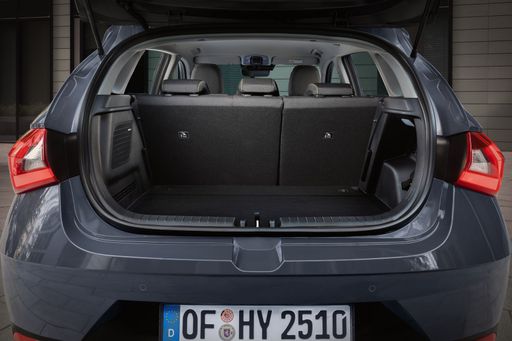 @ hyundai.news
@ hyundai.news
Subaru Forester
The Subaru Forester is a versatile SUV known for its impressive off-road capabilities and practical design. With a spacious interior and advanced safety features, it offers comfort and security for both city driving and outdoor adventures. Its reliable performance and all-wheel-drive system make it a popular choice among those who appreciate a combination of functionality and rugged charm.
details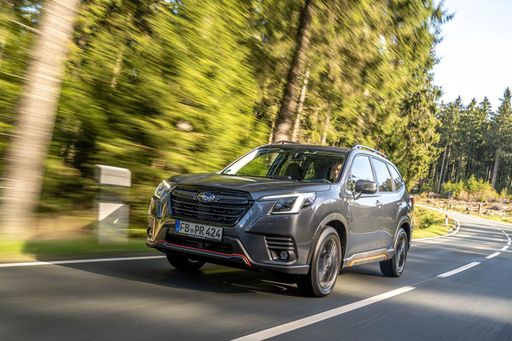 @ Subaru
@ Subaru
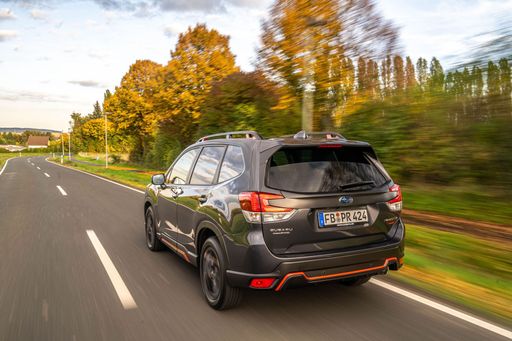 @ Subaru
@ Subaru
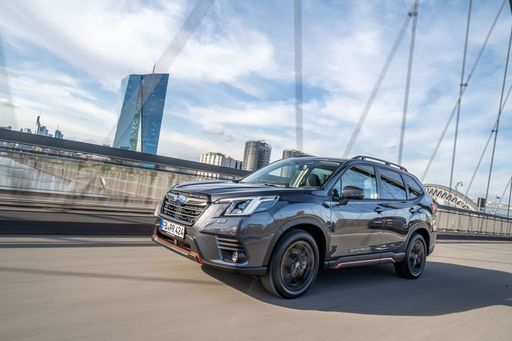 @ Subaru
@ Subaru
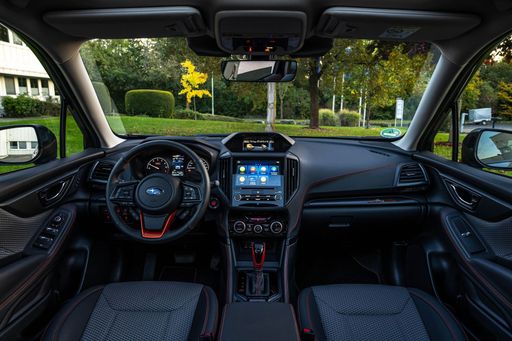 @ Subaru
@ Subaru
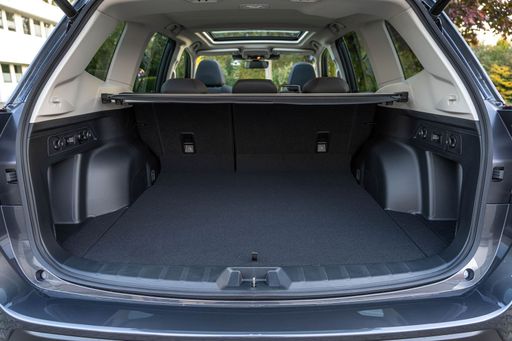 @ Subaru
@ Subaru

|

|
|
|
|
Costs and Consumption |
|
|---|---|
|
Price
17400 - 24000 £
|
Price
34700 - 42200 £
|
|
Consumption L/100km
5.2 - 5.3 L
|
Consumption L/100km
8.10 L
|
|
Consumption kWh/100km
-
|
Consumption kWh/100km
-
|
|
Electric Range
-
|
Electric Range
-
|
|
Battery Capacity
-
|
Battery Capacity
-
|
|
co2
119 - 121 g/km
|
co2
183 g/km
|
|
Fuel tank capacity
40 L
|
Fuel tank capacity
48 L
|
Dimensions and Body |
|
|---|---|
|
Body Type
Hatchback
|
Body Type
SUV
|
|
Seats
5
|
Seats
5
|
|
Doors
5
|
Doors
5
|
|
Curb weight
1088 - 1190 kg
|
Curb weight
1693 - 1739 kg
|
|
Trunk capacity
352 L
|
Trunk capacity
508 L
|
|
Length
4065 - 4075 mm
|
Length
4670 mm
|
|
Width
1775 mm
|
Width
1830 mm
|
|
Height
1450 - 1455 mm
|
Height
1730 mm
|
|
Payload
450 - 472 kg
|
Payload
446 - 492 kg
|
Engine and Performance |
|
|---|---|
|
Engine Type
Petrol MHEV, Petrol
|
Engine Type
Petrol MHEV
|
|
Transmission
Automatic, Manuel
|
Transmission
Automatic
|
|
Transmission Detail
Dual-Clutch Automatic, Manual Gearbox
|
Transmission Detail
-
|
|
Drive Type
Front-Wheel Drive
|
Drive Type
All-Wheel Drive
|
|
Power HP
79 - 100 HP
|
Power HP
136 HP
|
|
Acceleration 0-100km/h
11.1 - 13.7 s
|
Acceleration 0-100km/h
12.20 s
|
|
Max Speed
166 - 183 km/h
|
Max Speed
188 km/h
|
|
Torque
113 - 200 Nm
|
Torque
182 Nm
|
|
Number of Cylinders
3 - 4
|
Number of Cylinders
4
|
|
Power kW
58 - 74 kW
|
Power kW
100 kW
|
|
Engine capacity
998 - 1197 cm3
|
Engine capacity
1995 cm3
|
General |
|
|---|---|
|
Model Year
2024
|
Model Year
2025
|
|
CO2 Efficiency Class
D
|
CO2 Efficiency Class
G
|
|
Brand
Hyundai
|
Brand
Subaru
|
Hyundai i20
Introducing the Hyundai i20: A Blend of Style and Efficiency
The Hyundai i20 has been a favourite in the subcompact car segment, loved for its innovative features and reliable performance. In its latest versions, the i20 continues to impress with a perfect balance of aesthetics and functionality. Below, we dive into the technical details that make the Hyundai i20 a compelling choice for modern drivers.
Powertrain and Efficiency: Where Performance Meets Economy
The Hyundai i20 lineup offers an array of engine options, ranging from a 1.0-litre T-GDI petrol engine to the energetic 1.0-litre T-GDI 48V hybrid. These engines generate between 100 PS to a remarkable 204 PS in the N Performance variant. The incorporation of a mild-hybrid system improves fuel efficiency, with consumption as low as 5.1 L/100 km.
With both automatic and manual transmissions available, drivers can enjoy crisp gear shifts and a smooth driving experience. Front-wheel drive ensures nimble handling, making city and motorway drives equally enjoyable.
Design: Compact in Form, Grand in Appearance
The Hyundai i20 showcases a sleek hatchback design with dimensions that perfectly blend urban agility with interior spaciousness. Measuring between 4065 mm to 4075 mm in length, and with a width of 1775 mm, it offers a roomy cabin while maintaining a compact silhouette. The bold grille and stylish LED headlights contribute to its modern, athletic look.
Advanced Features and Technology
Innovation is at the heart of the Hyundai i20's appeal. It comes equipped with an impressive suite of technological features designed to enhance the driving experience. This includes a state-of-the-art infotainment system, which provides seamless connectivity through both Apple CarPlay and Android Auto.
The Hyundai SmartSense package is offered for peace of mind, with a suite of safety features like Forward Collision-Avoidance Assist and Lane Keeping Assist. These technologies ensure that you stay safe and in control, whether navigating city streets or hitting the open road.
Performance Variants: The Hyundai i20 N
For those who crave thrill, the i20 N variant doesn't disappoint. With 204 PS and a 6.2-second acceleration from 0 to 100 km/h, this hot hatch is designed for pure driving pleasure. It features an enhanced suspension setup and a range of performance-focused enhancements.
The i20 N embodies a spirit of adventure with its distinctive design cues and sporting credentials, perfect for enthusiasts who appreciate both performance and aesthetics.
Interior Comfort and Practicality
The interior of the Hyundai i20 is equally striking, with high-quality materials and a thoughtful layout that prioritises driver comfort and convenience. The cabin comfortably seats five passengers, while the boot offers a generous 352 litres of luggage space.
With an array of trim levels available, including N-Line and Prime, buyers can tailor the i20 to their tastes, ensuring they enjoy both luxury and practicality.
Final Thoughts: A Car Built for Modern Needs
The Hyundai i20 is more than just a car; it's a statement of style, efficiency, and innovation. Whether you're navigating busy urban streets or embarking on a road trip, the i20 is designed to meet the needs of contemporary drivers. With its range of engines, innovative features, and stylish design, the Hyundai i20 stands out in its class as a well-rounded and highly appealing choice.
Subaru Forester
The Subaru Forester: A Staple of Innovation
The Subaru Forester continues to stand out as a robust and reliable choice in the SUV market. Known for its rugged capabilities and thoughtful design, the Forester combines traditional Subaru strengths with modern technological innovations. As an all-wheel-drive vehicle, it promises safety, efficiency, and performance in a dynamic package.
Engineering and Performance
At the heart of the Subaru Forester lies its 2.0-litre petrol mild-hybrid engine, delivering a stout 150 PS and 194 Nm of torque. This power is channelled through an advanced CVT gearbox, ensuring smooth and responsive acceleration. The vehicle can sprint from 0 to 100 km/h in approximately 11.8 seconds, showing its agility despite its SUV stature.
One of the highlights is its all-wheel-drive system, designed to offer excellent traction and stability across diverse driving conditions. The Forester provides a top speed of 188 km/h, ensuring an exciting drive whether you're navigating city streets or venturing onto the open road.
Technical Specifications
The Forester maintains a balance between practicality and efficiency. With a fuel consumption rate of 8.1 L/100km and CO2 emissions positioned at 185 g/km, this SUV provides an efficient yet powerful performance. The mild-hybrid system is supported by a 0.6 kWh battery, offering enhanced fuel economy and reducing environmental impact.
Weighing between 1658 and 1693 kg, the Forester is designed to offer both robustness and fuel efficiency. It boasts a generous cargo capacity of 509 litres, perfect for both daily use and adventurous getaways. The exterior dimensions—4640 mm in length, 1815 mm in width, and 1730 mm in height—strike a balance between presence and manoeuvrability.
Design and Interior Features
With a sleek and modern design, the Forester is available in several trims catering to different customer preferences, such as the Trend Lineartronic, Active Lineartronic, and the luxurious Edition Exclusive Cross Lineartronic. The interior space is noteworthy, providing comfortable seating for five passengers, making it an excellent option for family journeys.
Safety and convenience are paramount in the Forester, featuring driver assistance systems designed to support and protect. The model comes equipped with state-of-the-art technology to keep occupants entertained and connected, enhancing the driving experience significantly.
Affordability and Running Costs
Price-wise, the Subaru Forester ranges from €37,790 to €46,450, aligning with its features and capabilities. The monthly costs for ownership may vary between €1125 and €1221, with costs per kilometre ranging from 45 to 48.9 cents. For those seeking an SUV that's a combination of comfort, reliability, and reasonable running costs, the Forester presents a persuasive choice.
Conclusion
The Subaru Forester remains a solid contender in the SUV segment, offering a mix of performance, practicality, and modern features. This vehicle is engineered for those who desire a dependable and versatile companion for all their adventures. With its blend of innovative technologies and classic Subaru reliability, the Forester continues to be an attractive option for discerning drivers.
The prices and data displayed are estimates based on German list prices and may vary by country. This information is not legally binding.
